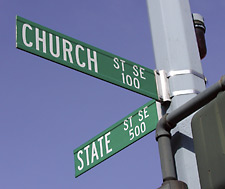by Dr Peter Bolt
In recent days there seems to be a rising tide of opinion, perhaps whipped into a strong surf by the Australian media, that "Church' and "State' need to be kept separate. The "Left' have been alarmed at yet another conservative victory in the recent federal election, which was aided and abetted, apparently, by "the Religious Right' rearing its head in Australian politics. Perhaps with the Hollingworth debacle fresh in mind, the public seem ready to be persuaded. In a move uncharacteristic of the "Left', a leaf is pulled from the history of the US of A, and the call is becoming increasingly shrill that "the Church' should keep out of "the State', as, it seems to be assumed, has been the case previously.
 But someone needs to demonstrate this assumption is so. Australia is not America. Our early history was studded with Christians in positions of influence, and evangelical Christians at that. These were people whose roots were well connected to Political Evangelicals such as William Wilberforce and his "drinking mates'(!) who were active for social change across a wide variety of agendas. These roots extended to NSW through people such as Governor Hunter, Governor Macquarie, the chaplains- cum-magistrates-and-landowners, a number of other officials, the editor of the first newspaper, and the school teachers. Our first Archdeacon, Thomas Hobbes Scott, during his brief but turbulent time in the colony, was second in importance only to the Governor, and had a seat in the fledgling Legislative Assembly. Christians were, of course, prominent in all kinds of voluntary societies seeking the betterment of others, but they were also involved in the movement towards trial by jury, self-government, the abolition of transportation, the acceptance of emancipated convicts into society, and other causes of "the State'.
But someone needs to demonstrate this assumption is so. Australia is not America. Our early history was studded with Christians in positions of influence, and evangelical Christians at that. These were people whose roots were well connected to Political Evangelicals such as William Wilberforce and his "drinking mates'(!) who were active for social change across a wide variety of agendas. These roots extended to NSW through people such as Governor Hunter, Governor Macquarie, the chaplains- cum-magistrates-and-landowners, a number of other officials, the editor of the first newspaper, and the school teachers. Our first Archdeacon, Thomas Hobbes Scott, during his brief but turbulent time in the colony, was second in importance only to the Governor, and had a seat in the fledgling Legislative Assembly. Christians were, of course, prominent in all kinds of voluntary societies seeking the betterment of others, but they were also involved in the movement towards trial by jury, self-government, the abolition of transportation, the acceptance of emancipated convicts into society, and other causes of "the State'.
And, from a "State-wards' direction, to cope with a new situation in which there was no established Anglican church, a large Roman Catholic population, and the presence of Methodists, Presbyterians, some Jews"”and even Unitarians"”unlike America, Australia appears to have decided against not supporting any, in favour of supporting them all.
And this simply continued into the present time. Rather than excluding religion, our constitution protected the right to freely practice. Christian groups have been present in our politics for a long time, from the DLP, to Call to Australia, to Family First. Our policy of multiculturalism ensures that every citizen is free to practice their religion and so our state is once again supporting all. In the present climate with the attachment of terrorism to some brands of Islam, it is difficult to see how religious issues are not a concern of the State. The increasing numbers of Australians in evangelical and Pentecostal churches each Sunday, and the changed social situation of Australian Roman Catholics, has given rise to politicians from both sides actually courting the Christian vote. Since the Family First preferences went to the Liberals, they appear to have been marginally ahead in this department, but this resulted in the Labor Party forming its Faith Values and Politics working group. No, it seems that our politicians, ruthlessly pragmatic as usual, do not believe in the separation of the Churches from the State. Even in the twenty-first century, Australia is not the quintessential Enlightenment land. From the beginning, through the middle, and even now as we are still heading towards the End, Australian society has been a
mixture of Enlightenment thought in interaction with strong Christian roots. So what do we say about the clamour for "Separation of Church and State' from some obviously uninformed quarters?
Before this new tide of opinion crashes us all on the beach, someone better ask the question whether the cry for separation of Church and State suffers from that most heinous of all crimes.
It is simply un-Australian.
Dr Peter Bolt is the executive editor of
The Australian Church Recordand lectures in New Testament at Moore Theological College.






















